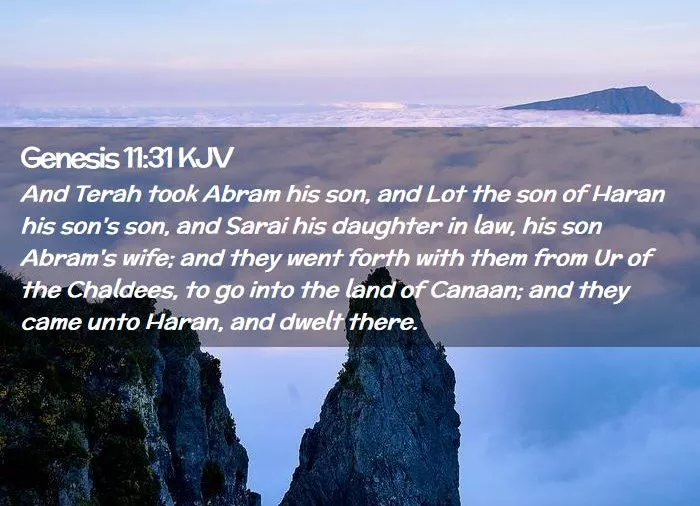Read the Daily Bible Verse Genesis 11:31 To Strengthen Your Spiritual Journey.
Genesis 11:31 is a significant verse in the Bible that marks a pivotal moment in the journey of Terah and his family. This verse reads: “And Terah took Abram his son, and Lot the son of Haran his son’s son, and Sarai his daughter in law, his son Abram’s wife; and they went forth with them from Ur of the Chaldees, to go into the land of Canaan; and they came unto Haran, and dwelt there” (KJV). This passage sets the stage for the subsequent calling of Abram (later Abraham) by God, which is foundational to the narrative of the Hebrew Bible and the Christian Old Testament.
The Context on Genesis 11:31 KJV
To fully understand Genesis 11:31, it is essential to consider its context within the broader narrative of Genesis. The chapter begins with the story of the Tower of Babel, where humanity’s pride leads to the confusion of languages and the scattering of people across the earth. Following this, the genealogy of Shem is presented, leading to Terah, the father of Abram. This genealogical account serves to connect the post-flood world with the patriarchal narratives that follow.
The Genesis 11:31 Meaning
Genesis 11:31 describes Terah’s decision to leave Ur of the Chaldees with his family, intending to go to the land of Canaan but settling in Haran instead. This verse highlights several key themes:
Migration and Obedience: Terah’s journey signifies a move towards a new beginning, a theme that resonates throughout the Bible. Although the ultimate call to Abram to leave Haran and go to Canaan comes later (Genesis 12:1), this initial move is a step in that direction.
Family and Leadership: Terah, as the patriarch, leads his family, including Abram, Sarai, and Lot. This leadership role underscores the importance of family units in the biblical narrative.
Divine Providence: While the text does not explicitly mention God’s command to Terah, the journey aligns with God’s broader plan for Abram and his descendants. This suggests an underlying divine providence guiding their steps.
Genesis 11:31 Application in Life
The story of Terah and his family can be applied to modern life in several ways:
Faith and Trust: Just as Terah embarked on a journey without knowing the final destination, individuals today are often called to step out in faith, trusting in God’s guidance even when the path is unclear.
Leadership and Responsibility: Terah’s role as a leader of his family highlights the importance of taking responsibility for those under one’s care and making decisions that align with a greater purpose.
Perseverance and Patience: The journey from Ur to Haran, and eventually to Canaan, was not immediate. This teaches the value of perseverance and patience in the face of life’s uncertainties.
See Also: Genesis 11:30 Meaning, Context & Commentary
Comparison with Other Biblical Texts
Genesis 11:31 can be compared with other biblical texts to gain a deeper understanding:
Genesis 12:1-4: This passage details God’s call to Abram to leave Haran and go to Canaan. It emphasizes Abram’s obedience and faith, building on the foundation laid in Genesis 11:31.
Acts 7:2-4: In Stephen’s speech before the Sanhedrin, he recounts the story of Abram, highlighting that God’s call came while Abram was still in Mesopotamia, before he lived in Haran. This provides additional insight into the timeline and divine guidance in Abram’s journey.
Hebrews 11:8-10: This passage in the New Testament commends Abram’s faith, noting that he obeyed and went, even though he did not know where he was going. It underscores the theme of faith and trust in God’s promises.
Modern-Day Relevance
The themes and lessons from Genesis 11:31 remain relevant today:
Journey of Faith: Many people experience times of transition and uncertainty. Genesis 11:31 encourages believers to trust in God’s plan and timing, even when the destination is not clear.
Family Dynamics: The importance of family and the role of leadership within the family unit are timeless principles that continue to resonate in contemporary society.
Divine Guidance: The idea that God guides and directs the steps of His people is a source of comfort and assurance for believers facing life’s challenges.
Conclusion
Genesis 11:31 is a rich and multifaceted verse that sets the stage for the unfolding story of Abram and his descendants. It highlights themes of migration, leadership, and divine providence, offering valuable lessons for faith, trust, and perseverance. By examining this verse in its biblical context and comparing it with other scriptures, we gain a deeper appreciation for its significance and relevance to our lives today.
Genesis 11:31 Commentary
Commentaries on Genesis 11:31 provide further insights into its meaning and implications. For example, Ellicott’s Commentary for English Readers notes that Terah’s migration may have been influenced by a combination of tribal movements and religious motives. The BibleRef commentary emphasizes the significance of Terah’s leadership and the family’s journey towards Canaan. These commentaries enrich our understanding of the text and its place within the broader biblical narrative.


